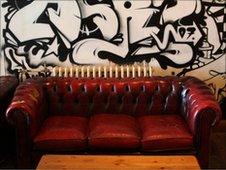Life after recycling: sell and reuse furniture
- Published

Salvaging an old sofa may not be as easy as you might expect
With budgets becoming tighter "make do and mend" is a wartime motto many more people are living by today.
Salvaging items other people have discarded is an obvious money saving option.
But the BBC has discovered that it is much easier to do this in some parts of the UK than in others.
Some recycling centres provide on site shops where dumped items are sold. Other councils refuse to allow people to take items away.
In Lymington in Hampshire a thriving shop on the waste centre site draws customers from miles around.
From 50p to £5 residents can buy anything from washing lines to golf club sets.
Workers spot potential bargains before they are thrown into the recycling skips and instead put them out on display, once they have been checked for safety.
Eileen Matthews who lives near New Milton visits the centre at least once a week.
'I think it's marvellous. I live off my pension so I come to try to find a bargain so that my money goes further for essentials.
"Many people don't realise that there are a lot of people who really need places like this, it's better than a charity shop because you can find furniture as well.''
25 other sites across Hampshire also offer items for sale as the County Council see re-use as a key part of its waste strategy.
''Facilities like this coupled with all our recycling services means that we have been able to drastically reduce the amount we send to landfill,'' said Councillor Mel Kendall.
''It makes sense to allow people to buy what other people don't want. The money which is made pays for the upkeep of the shop.''
Health and safety
It is a very different experience at the municipal waste site in Bristol.
People from across the city centre come to dump or recycle their waste at the centre in St Philips, but no one is allowed to take items away.
The city council says it is because the site is too small and claim it is due to various health and safety issues.
It is frustrating for charities who could collected unwanted items.
The Sofa Project refurbishes fridges and washing machines just across the road from the Bristol recycling centre.
''Only about 5% of the items we refurbish here are redirected from the council. Fortunately we are just next door so we have put signs out and some people do leave items here,'' said Julian Williams, chief executive of the Sofa Project.
He adds: ''We have been talking to the council and we are hopeful that from next year, the situation will improve.''
10 million items
Mr Williams is also on the board of the Furniture Re-use Network which represents 350 charities and non-profit groups involved in re-use across the UK.
Its figures show that 10 million items of furniture are thrown away every year.
''We would like to see a charitable shop on every recycling site in the country to cut down on this waste.
"There is no national mandate about how recycling and reuse should be run and the government has really left this up to individual councils to decide for themselves,'' he says.
The national waste strategy states that re-using, rather than recycling discarded items should be the priority.
"There are many different great examples of charities and councils who run schemes for people to take goods that are no longer wanted but haven't reached the end of their life. After all, what might be waste for some, is a resource for others,'' says the Environment Secretary, Caroline Spelman.
"After all, no-one wants to see items such as toys or furniture dumped if they can still be used."